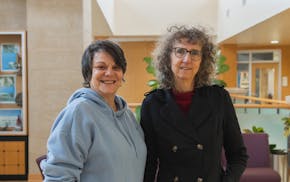Before Simone French was one of the nation's foremost researchers on eating habits -- long before her studies warned about fast-food marketing and Coke machines in schools -- she was a teen who snacked after school on Twinkies and dined with her mom at Burger King.
Which is to say she understands the cravings and time crunches and cost concerns that make people choose unhealthy foods even when they know, deep down, they shouldn't. "Right now," she said in an interview this week, "the easy choice is the unhealthy choice."
French, 46, is part of a powerhouse team at the University of Minnesota's School of Public Health that won a $7 million federal grant last week to change the habits of hundreds of local families. The project is part of an ongoing university research program that seeks to motivate better health and eating through studies of family dinners, school lunches and food commercials.
The U's new project is one of the first times that researchers will wrap multiple, proven solutions around families all at once, including health advisers, classes on eating and exercise, and vouchers for healthy food that the researchers will make sure is stocked in their neighborhood stores.
"If this doesn't work," French said, "I don't know what will."
French's entire career has focused on these issues, starting with a research position she took while earning a social psychology degree at the U.
She tries to live out the values she advocates. She hasn't even been to the State Fair in years -- other than to take pictures for lecture slides on food portions and obesity.
But she isn't perfect.
Temptation involves anything with white frosting. As a single adult living in Uptown, she's also fond of deli food from Lunds in lieu of cooking her own dinners.
While running and biking provide some recreation, ballet class is her favorite source of exercise. The class provides stress relief -- the pressures of work fade away while she focuses on getting a leg stretched or a toe pointed -- but also an astonishing workout. She needed a nap after her first class, 15 years ago, but loved it.
"If [exercise] is torture," she said, "you're not going to do it."
Raised with two siblings by a single mom, French sympathizes with parents. Families with two working parents struggle to find time to make dinner, she notes. Those in poorer neighborhoods might lack safe parks for exercise or affordable produce in local stores.
Nonetheless, she said, "Parents really are the home environment managers. They decide when [families] watch TV or how much McDonald's they eat or when they're going to get the frosted Lucky Charms."
Role models
In addition to the time and money pressures they face, today's parents were raised on the novelty of TV dinners and didn't gain their parents' cooking skills, she said. So many parents she meets in her work are struggling to instill good habits in their children while continuing their own bad ones.
"They want their kids to eat well, but they don't want to stop" drinking soda or munching potato chips, she said. "It doesn't work because you have to be a role model, and you have to decide what kind of food to bring into the house."
At first glance, French seems to be fighting a losing battle. The U.S. Centers for Disease Control and Prevention has estimated that 34 percent of American adults are obese, up sharply over the past decade. Another 34 percent are overweight.
French believes public health research at the U and other institutions is starting to chip away at that trend by motivating insurers, employers, schools and governments to enact good health policies.
The U's Project Eat, under the direction of Dianne Neumark-Sztainer, continues to publish influential survey results showing, for example, that kids eat better when they have family dinners, are involved in food preparation and don't watch so much TV. Mary Story, a codirector with French of the U's Obesity Prevention Center, is in charge of a national program funded by the Robert Wood Johnson Foundation to promote healthy eating.
French's studies have examined everything from how price affects the selection of healthy foods in workplace vending machines to the impact of nutrition labeling on fast-food meal choices.
Her most recent study of 100 families over one year is about to be published. She said relatively mild interventions helped the families eat more fruits and vegetables and less fast food. A review of food receipts from the first and last weeks of the study found that families learned to make better food purchases and take fewer trips to eat out.
Willpower?
French supports tougher laws to reverse the nation's obesity epidemic. Schools should dump soda machines, even if they provide valuable revenue, she said. She also supports restrictions on foods that can be bought through government assistance programs.
She commended the state Health Department and the Institute for Agriculture and Trade Policy for bringing farmers markets to lower-income neighborhoods and connecting convenience stores statewide with wholesalers that provide affordable produce.
French's latest grant is designed to prevent childhood obesity, but she said that will happen only by influencing parents and making eating well an easier choice. Recruiting hasn't started, but families are already calling, she said. "People do feel overwhelmed."
Critics have already suggested that the grant is a waste and that obese people need to toughen up and control their eating. But French said that kind of cynicism ignores the personal and social challenges that have made 70 percent of Americans overweight.
"It's not willpower," she said. "Seventy percent of the population isn't weak-willed and lazy."
Despite her zeal, French understands everyday realities. Despite a healthy eating policy at the School of Public Health, French said meetings still feature doughnuts or snacks, because leaders worry that nobody will show up otherwise. She has tried to remind colleagues of the policy without seeming like the "food police."
"Why do you need doughnuts at every meeting?" she asked. "You don't."
Jeremy Olson • 612-673-7744

Yuen: Why do people forgive? It's messy, complex and 'the best form of self-interest'
How the Goo Goo Dolls learned the music biz from Minneapolis bands
